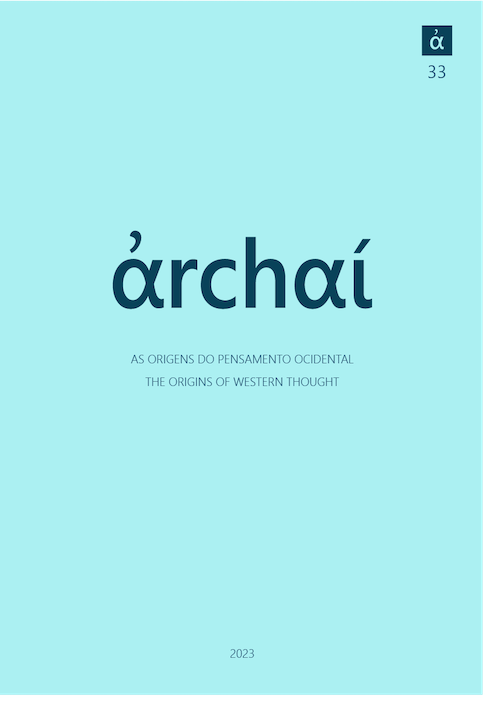The Dialectical Syllogism in Aristotle’s Topics
DOI:
https://doi.org/10.14195/1984-249X_33_30Palavras-chave:
Aristotle’s dialectic, Dialectical syllogism, EndoxaResumo
The purpose of this paper is an attempt to delimitate what the dialectical syllogism looks like in Aristotle’s Topics. Aristotle never gave an example of a dialectical syllogism, but we have some clues spread over books I and VIII of the Topics which make it possible to understand at least what within a dialectical debate is a dialectical syllogism. The interpretation advanced here distinguishes the logical order of the dialectical argumentation from the order of the debate. This distinction enables us to have a better understand of what is and how the dialectical syllogism is identified in the debate. In addition, we can solve some interpretative difficulties other interpretations could not solve, and have a more solid grasp of how endoxa are used in a dialectical debate.
Downloads
Referências
ANGIONI, L. (2012). Três tipos de argumento sofístico. Dissertatio, v. 36, p. 187-220.
BARNES, J. (2011). Aristotle and the methods of ethics. In: BONELLI, M. (Ed.). Method and Metaphysics: essays in Ancient Philosophy I Oxford, Oxford University Press, p.174-194.
BOLTON, R. (1999) The epistemological basis of Aristotelian dialectic. In: SIM, M. (Ed.). From puzzles to principles: essays on Aristotle’s dialectic. Lanham, Lexington Books, p. 57-105.
BRUNSCHWIG, J. (1986). Aristotle on Arguments without Winners or Losers. In: Wissenschaftskolleg Jahrbuch 1984/5. Berlin, Siedler Verlag, p. 31-40.
BRUNSCHWIG, J. (2007). Aristote: Topiques, Livres V-VIII Paris, Les Belles Lettres.
KARBOWSKI, J. (2015). Complexity and progression in Aristotle’s treatment of Endoxa in the topics. Ancient Philosophy, v. 35, n. 1, p. 75-96.
MENDONÇA, F. M. (Forthcoming). Os Tópicos e a competência dialética: lógica e linguagem na codificação do debate dialético. Uberlândia, Edufu.
MENDONÇA, F. M. (2023). Vencedores e derrotados no debate dialético de acordo com Aristóteles [Manuscript submitted for publication]. Instituto de Filosofia, Universidade Federal de Uberlândia.
REEVE, C. D. C. (1998). Dialectic and philosophy in Aristotle. In: GENTZLER, J. Method in Ancient Philosophy . Oxford, Oxford University Press , p. 227-252.
SMITH, R. (1993). Aristotle on the Uses of Dialectic. Synthese, v. 96, n. 3, p. 335-358.
SMITH, R. (1997). Aristotle’s Topics: Books I and VIII with excerpts from related texts. Oxford, Clarendon Press.
SMITH, R. (1999). Dialectic and Method in Aristotle. In: SIM, M. (Ed.). From puzzles to principles: essays on Aristotle’s dialectic. Lanham, Lexington Books , p. 39-55.
STRIKER, G. (2009). Aristotle’s Prior Analytics book I: Translated with an introduction and commentary. Oxford, Oxford University Press.
Downloads
Publicado
Como Citar
Edição
Seção
Licença
Copyright (c) 2023 Fernando Martins Mendonça

Este trabalho está licenciado sob uma licença Creative Commons Attribution 4.0 International License.
Dado o acesso público desta revista, os textos são de uso gratuito, com obrigatoriedade de reconhecimento da autoria original e da publicação inicial nesta revista. O conteúdo das publicações é de total e exclusiva responsabilidade dos autores.
1. Os autores autorizam a publicação do artigo na revista.
2. Os autores garantem que a contribuição é original, responsabilizando-se inteiramente por seu conteúdo em caso de eventual impugnação por parte de terceiros.
3. Os autores garantem que a contribuição que não está em processo de avaliação em outras revistas.
4. Os autores mantêm os direitos autorais e concedem à revista o direito de primeira publicação, sendo o trabalho licenciado sob a Creative Commons Attribution License-BY.
5. Os autores têm permissão e são estimulados a publicar e distribuir seu trabalho on-line após a publicação na revista.
6. Os autores dos trabalhos aprovados autorizam a revista a, após a publicação, ceder seu conteúdo para reprodução em indexadores de conteúdo, bibliotecas virtuais e similares.
7. É reservado aos editores o direito de proceder ajustes textuais e de adequação do artigo às normas da publicação.



